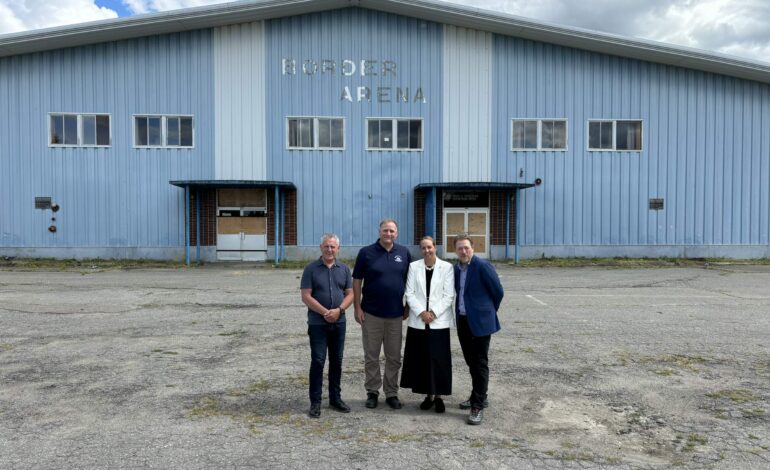
A new 66-unit apartment complex will soon replace the former Border Arena site in St. Stephen through a partnership between the municipality and Dock Apartments Inc., a local company led by Charlotte County developer Tressa Bevington.
Mayor Allan MacEachern said the development represents a major step toward addressing the community’s housing needs.

“It means a lot, especially in this competitive world of encouraging and finding developers,” MacEachern said to The Courier. “We are so lucky to have Tressa and her family stepping up to the plate once again in our community. The location is great. It checks all the boxes—close to all their amenities: school, shopping, groceries—everything. It’s right in the core.”
The project will move ahead through the town’s existing incentive policy, which offers tax-based grants to help attract developers and speed up construction timelines.
“We used our incentive policy, which works very well,” said MacEachern. “We were very aggressive because we know the urgent need for housing in our community. We also helped speed up the process to encourage a quicker turnaround time on starting to build. All that together got us to where we’re at today.”
Building indoors for a Canadian winter
In an innovative approach to construction, Bevington’s company plans to use the existing arena structure to build components of the new apartments inside before demolition begins. The Border Arena building has been used mainly for storage since the Garcelon Civic Centre opened in 2014.
“It’s big enough that they can pre-assemble or prefab a lot of work beforehand,” MacEachern explained. “They’re really smart that way—proactive and efficient and using the tools they have to help with their build. It’s a great idea.”
Bevington said she was drawn to the site because of its central location and its potential to fill a critical housing gap.
“After we finished the Compass building in St. Andrews, we were approached by the Town of St. Stephen and Future St. Stephen about building there because of the housing crisis,” she said. “I was really interested in the arena site because of its location—close to schools, workplaces, and the grocery store—so it’s convenient for future tenants. We’re working with the town to tear the arena down starting in January, and we’re looking forward to turning the site into a 66-unit apartment building.”
Local partnership
Bevington said the municipality made the project possible by providing access to the land and economic incentives.
“There’s a land agreement and some economic incentives,” she said. “The biggest thing is making the land available and giving us the arena to make it happen.”
MacEachern said the town’s incentive policy was essential to bringing the project forward.
“Our incentive works based on the tax generated,” he said. “They’ll get a percentage of that back over the years. At the end of the day, it’s like a tax break, but it’s a grant that covers that extra tax that we’re receiving. It’s money in, money out. It’s not like we’re losing money, because it doesn’t exist today.”
Housing that helps the community thrive
Bevington, whose previous projects include the Anchors Landing and the Compass buildings in St. Andrews and Beacon Apartments in St. Stephen, said housing has a transformative impact on individuals and communities.
“Through developing, I’ve learned how much housing can change a person’s life,” she said. “When people move in and get the keys, they’re often starting a new chapter. It’s not just an apartment—it’s their home. Focusing on that helps families and the wider community immensely.”
She said the new building will feature studio, one-, two-, and three-bedroom units, each with balconies, and will include a mix of housing options to meet community needs. Bevington said the project’s focus remains on keeping rent reasonable and that exact affordability targets will depend on Canada Mortgage and Housing Corporation funding and its conditions.
“It benefits everyone: people looking for a home, seniors who want to downsize, businesses trying to attract talent, and the hospital that needs staff but lacks housing,” Bevington said. “It impacts many parts of the community and shouldn’t be discounted as a small project.”
Bevington said her team uses local tradespeople and takes pride in building close to home.
“I want to see Charlotte County thrive, not just survive,” she said. “I use all local trades—everyone was excited to get going again. My father is my project manager and does an amazing job. You have to enjoy the process, and I do.”
Looking ahead
Construction is expected to begin in January 2026 with a timeline of 18 to 20 months.
“For reference, the Compass took about a year,” Bevington said. “As long as there’s a housing crisis and I can be part of the solution, I’ll keep building.”
MacEachern said the town has heard consistent calls for more housing and acted quickly to make this project happen.
“The community has been really pushing for housing,” he said. “We had to make it happen. We had to speed it up. We had to get in there and make it work.”



